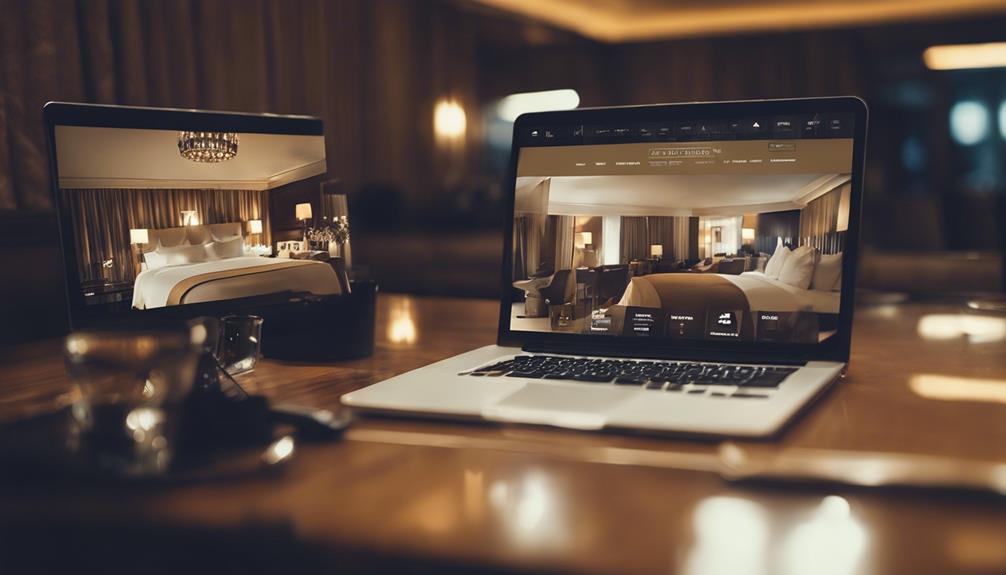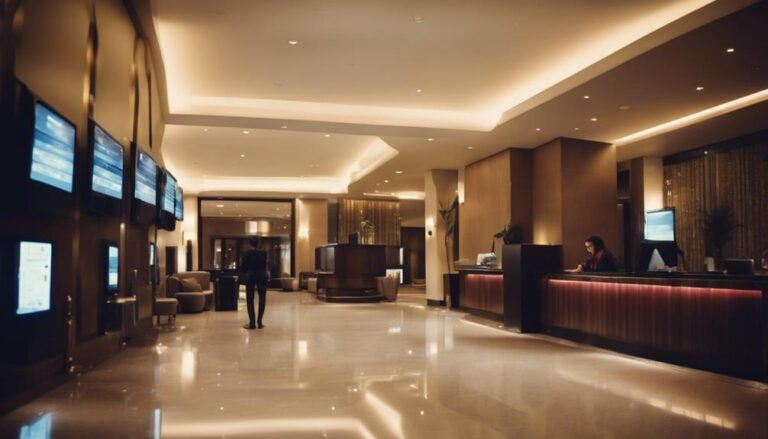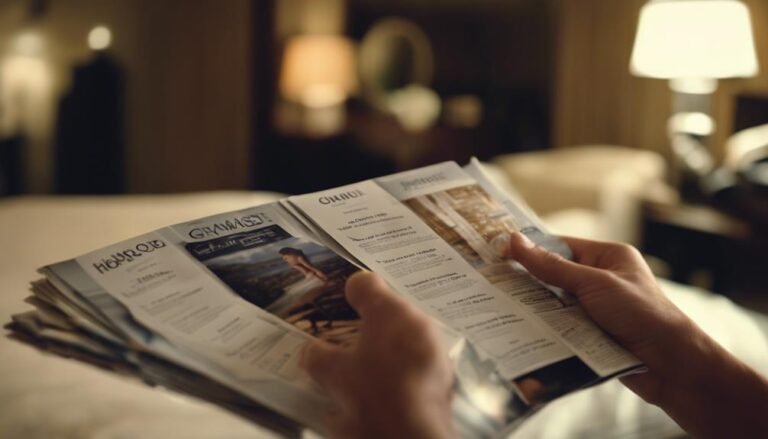SEO Strategies for Boosting Hotel Website Visibility
Imagine your hotel's website as a hidden gem waiting to be discovered in a vast digital landscape. With the right SEO strategies, you can ensure that your website shines brightly and attracts more visitors.
From optimizing keywords to enhancing user experience, every step you take can significantly impact your website's visibility. Stay tuned as we uncover effective techniques to boost your hotel website's online presence and drive more traffic your way.
Key Takeaways
- Incorporate long tail keywords for targeted visibility.
- Optimize content with local SEO strategies for geo-targeted reach.
- Utilize social media integration to boost brand awareness.
- Create engaging content and build backlinks for enhanced visibility.
Keyword Research
To enhance your hotel website's visibility on search engines, begin by conducting thorough keyword research to identify the most relevant and high-traffic terms for your target audience. Competitor analysis is a crucial aspect of this process. By analyzing your competitors' keywords, you can gain valuable insights into what's working in your industry and tailor your own strategy accordingly. Look for opportunities where your competitors might be ranking well and identify long tail keywords that they may have overlooked.
Long tail keywords are specific phrases that visitors are more likely to use when they're closer to making a booking decision. Incorporating these long tail keywords into your website content can help attract more qualified traffic and improve your chances of conversion. Utilize tools like SEMrush or Ahrefs to identify relevant long tail keywords with lower competition but higher conversion potential.
On-Page Optimization
Enhance your hotel website's search engine visibility by optimizing on-page elements to improve user experience and boost organic traffic.
Optimizing on-page elements is crucial for your hotel website's SEO success. By focusing on key aspects such as meta tags optimization, image optimization, internal linking, and page speed, you can significantly enhance your website's visibility and user experience.
- Meta Tags Optimization: Crafting relevant meta titles and descriptions can improve click-through rates and keyword visibility in search results.
- Image Optimization: Optimizing images with descriptive file names and alt text not only enhances user experience but also contributes to better rankings in image searches.
- Internal Linking: Strategic internal linking helps search engines navigate your site efficiently and establishes a hierarchy for your content.
- Page Speed: Ensuring fast loading times can reduce bounce rates and improve user engagement, leading to higher search rankings.
Local SEO Strategies
Implementing targeted local SEO strategies can significantly boost your hotel website's visibility in specific geographical areas, driving relevant traffic and increasing bookings. One key aspect of local SEO is optimizing your website for geo targeted keywords that potential guests in your area are likely to use when searching for accommodations. By incorporating these keywords naturally throughout your website's content, meta tags, and headings, you can improve your chances of appearing in local search results.
Another crucial element of local SEO is the management of local citations. These are online mentions of your hotel's name, address, and phone number (NAP) on various platforms such as business directories, review sites, and social media. Consistent and accurate citations across the web can enhance your hotel's credibility and trustworthiness in the eyes of both search engines and potential guests.
To illustrate further, here is a table showing the potential impact of implementing local SEO strategies:
| Local SEO Strategy | Impact |
|---|---|
| Geo Targeted Keywords | Increased visibility in local searches |
| Local Citations | Enhanced credibility and trustworthiness |
| User-Generated Reviews | Improved reputation and ranking |
Mobile-Friendly Website Design
Optimizing your hotel website for mobile devices is critical in maximizing user experience and enhancing overall visibility. With the increasing use of smartphones for travel planning and bookings, ensuring that your website is mobile-friendly is essential. Here are some key strategies to improve your website's mobile usability:
- Responsive Design: Implement a responsive design that adapts to different screen sizes, ensuring a seamless experience for users across devices.
- Fast Loading Times: Optimize your website for quick loading speeds on mobile devices to prevent users from bouncing off due to long wait times.
- Mobile-Friendly Navigation: Simplify navigation for mobile users by using clear menus and intuitive design elements to enhance user experience.
- Optimized Content: Ensure that your content is easy to read and interact with on mobile devices, keeping text concise and images optimized for quick loading.
High-Quality Content Creation
To enhance your hotel website visibility, focus on creating high-quality content that isn't only relevant but also engaging. By ensuring your content aligns with the needs and interests of your target audience, you can increase user engagement and improve your search engine rankings.
Incorporating visually appealing elements can further captivate visitors and encourage them to explore your website further.
Content Relevance
Crafting high-quality content is pivotal in boosting your hotel website visibility through SEO. To ensure your content is relevant and engaging, consider the following strategies:
- Content Depth: Create in-depth articles that cover various aspects of your hotel, such as amenities, nearby attractions, and special offers.
- Semantic SEO: Utilize semantic keywords and phrases related to your hotel's location, services, and unique selling points to enhance search engine visibility.
- User Intent Alignment: Tailor your content to match the search intent of users, providing valuable information that meets their needs.
- Regular Updates: Keep your content fresh and up-to-date to show search engines that your website is active and relevant in the hospitality industry.
Engaging Visuals
For enhanced online presence and user engagement, incorporating captivating visuals is essential in your hotel website's content strategy. Visual storytelling plays a crucial role in conveying the unique experience your hotel offers. By using inspirational imagery that showcases your hotel's amenities, rooms, and local attractions, you can create a compelling narrative that resonates with potential guests.
High-quality photos and videos not only capture attention but also drive interest and bookings. Utilize visually appealing content to evoke emotions and create a connection with your audience, ultimately leading to increased website visibility and higher conversion rates.
User Experience Enhancement
Enhancing user experience on your hotel website involves optimizing navigation for seamless interaction and prioritizing content that resonates with your target audience. To ensure a positive user experience, consider the following strategies:
- Intuitive Website Navigation: Simplify your website navigation by organizing menu items logically and providing clear paths for visitors to explore different sections. Easy navigation enhances user engagement and encourages longer browsing sessions.
- Fast Loading Speed: Improve loading speed by optimizing images, leveraging browser caching, and minimizing unnecessary scripts. A fast-loading website not only enhances user experience but also positively impacts search engine rankings.
- Mobile Responsiveness: Ensure your website is mobile-responsive to cater to users accessing your site on various devices. Responsive design enhances user experience by adjusting the layout for different screen sizes, leading to higher user satisfaction.
- Engaging Content: Create compelling and relevant content that captivates your audience. Tailor your content to address the needs and interests of your target demographic, keeping them engaged and encouraging repeat visits.
Link Building Techniques
To enhance your hotel website's visibility, you need to focus on quality backlink sources and anchor text optimization. Quality backlinks from reputable sites can significantly boost your website's authority and search engine rankings.
Quality Backlink Sources
Utilize reputable and authoritative websites as your primary sources for quality backlinks to enhance your hotel website's visibility and search engine rankings. When building backlinks, focus on acquiring links from high-quality websites that are relevant to the hospitality industry. This strategic approach will signal to search engines that your website is a trusted source of information.
To boost your hotel website's SEO performance, consider the following sources for quality backlinks:
- Guest posts on industry-leading blogs
- Collaboration with local tourism websites
- Partnerships with reputable travel influencers
- Citations in online directories
Anchor Text Optimization
For effective link building techniques, ensure your anchor text optimization aligns with your hotel website's target keywords and overall SEO strategy. When optimizing anchor text, it's crucial to use relevant keywords that accurately describe the linked page. This helps search engines understand the context of the link, improving the credibility and authority of your website. Here's a breakdown of anchor text optimization strategies:
| Anchor Text Type | Example | Best Practices |
|---|---|---|
| Exact Match | Best hotel in town | Align with target keywords for a specific page |
| Partial Match | Top-rated accommodations | Include variations of keywords for natural language |
| Branded | Your Hotel Name | Use your brand name for brand recognition and authority |
Social Media Integration
Integrating social media channels into your hotel website can significantly enhance online visibility and engagement with potential guests. Social media is a powerful tool that can amplify your hotel's online presence and drive traffic to your website. By strategically incorporating social media integration, you can strengthen your brand's digital footprint and reach a wider audience.
Here are some key strategies to leverage social media effectively:
- Collaborate with Influencers: Partnering with influencers in the travel and hospitality industry can help increase your hotel's visibility and credibility.
- Run Targeted Social Media Campaigns: Create engaging campaigns to promote special offers, events, and unique selling points of your hotel.
- Foster Community Engagement: Interact with your audience, respond to comments and messages, and create a sense of belonging within your online community.
- Boost Brand Awareness: Consistently share high-quality content, showcase your hotel's unique features, and maintain a cohesive brand identity across all social media platforms.
Performance Tracking and Analysis
To effectively optimize your hotel website's online visibility and engagement, tracking and analyzing performance metrics is crucial for understanding the impact of your digital marketing efforts. By implementing conversion tracking, you can monitor the effectiveness of your website in turning visitors into customers, allowing you to make data-driven decisions to enhance conversion rates.
Additionally, conducting competitor analysis enables you to benchmark your website's performance against others in the industry, identifying areas for improvement and gaining a competitive edge.
Performance metrics such as website traffic, bounce rates, and average session duration provide valuable insights into user behavior and engagement levels. Trend analysis allows you to identify patterns and fluctuations in performance over time, helping you adapt your strategies to capitalize on successful trends and rectify underperforming areas promptly.
Conclusion
In conclusion, implementing effective SEO strategies for your hotel website is like laying the foundation for a skyscraper – each element working together to build something strong and visible.
By conducting thorough keyword research, optimizing your pages, focusing on local SEO, and creating high-quality content, you can enhance user experience, build quality links, integrate social media, and track performance for continuous improvement.
Stay strategic, analytical, and data-driven to boost your website visibility and drive more bookings.






